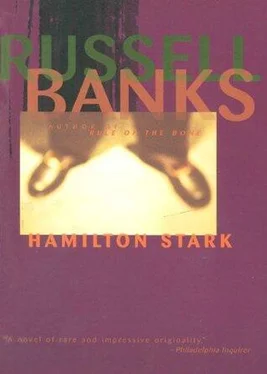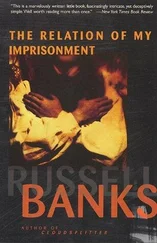But what others heard was a frighteningly literal growl. For them it began with a deep rumbling from Alvin’s chest that thinned, tightened, and rose in pitch as it moved up his throat. Then, finally, after resonating in his mouth, the noise would flow like a metal ribbon between his teeth, usually driving anyone near him back a step or two in surprise and, for a second, fear. Then, when it was apparent that Alvin was not conscious of his noise, came the nervous laughter, the light mockery. In turn, his response was usually one of irritation and slight embarrassment — irritation that he was being distracted from expressing his anger, embarrassment that he was not fully aware of how he was being perceived. And too, from some corner of his mind, embarrassment that he was angry at all and had been found out, betrayed, almost, by a noise his body seemed to make involuntarily.
The Valley Café was a neighborhood tavern located in a row of wood tenements south of the center of Ausable Chasm at the edge of the Ausable Chasm River, which, a few miles downstream, emptied into Lake Champlain. It was a small place, a storefront, actually, with a dark bar along one side of the room and a dozen or so red plastic-seated booths along the other. At the back were three doors, one leading from behind the bar to the small kitchen, the second leading to a pair of filthy, unventilated restrooms, the third, marked by an Exit sign, leading to an alley. At the front there were two large plate glass windows painted dark green from the low sills to eye level, with a small red neon sign in each pane that rapidly blinked VALLEY CAFÉ.
The place was quiet, dimly lit, almost empty. In its own toughly cynical way, the bar was friendly. It worked hard at seeming to be no more than what it was, a neighborhood bar. Anything that was deliberately atmospheric, as if to attract strangers, would not have made sense, no more to the patrons than to the owners. A juke box was allowed, was not thought pretentious or, worse, naïve, but only if the songs were the type of melancholy love songs that celebrated stoical loss, songs ten years out of date sung by middle-aged crooners who’d broken in with the big bands in the thirties and forties.
Alvin and Feeney walked up to the bar and ordered Seven-and-Sevens from the beefy, T-shirted bartender. He was a chinless, balding man in his fifties, his thick arms covered with faded red and blue tattoos. His T-shirt was stretched tightly across a belly that clung to the front of him like a tortoise shell, below which he had tied a white apron like a bib. He served the boys quickly and went back to his post at the front of the bar, where he had spread his newspaper. Planting both elbows on the counter, his chin resting against his knuckles, he resumed reading, slowly moving his lips as he read.
In a few seconds, having grown accustomed to the semi-darkness of the room, the boys took a look around them to see where, in fact, they were and who was there with them. At the far end of the bar, in a bank of shadows, hunched a man in his late sixties, a serious afternoon drinker with a shot of blond whiskey and a glass of flat draft beer arranged precisely in front of him. In one of the booths, with his back to the bar, a young man in khaki work clothes was arguing in a hissing voice with a tubby, bleached-blond, middle-aged woman who was barely listening, but now and then making a low-voiced comment that would set the young man off and hissing again. He chain-smoked from a pack of Camels in front of him, and she affectionately studied her pink-painted fingernails. For a minute Alvin wondered why the young man was haranguing her. Were they married to each other? Lovers? Brother and sister? He gulped down the last of his drink and called for another.
Maybe she was a prostitute and he was her pimp. Naw, impossible. The guy’s wearing work clothes. Besides, she’s too old and fat to be a prostitute. What’s it like, he wondered, to fuck a woman that old and that fat?
She was looking across at him then, not quite staring, but openly, undeniably, looking at him. Alvin returned her gaze. Feeney, staring down into his glass, went on chattering, something about California, L.A., swimming year-round, beautiful cars, a ‘49 Olds 88… Alvin noticed that the woman’s face was not unattractive. She had bright, dark, heavily made-up eyes that were wide apart and low on her face, and a full mouth that she had painted pink, to match her fingernails. Her hair was short and curly, fluffy almost. The color of vanilla ice cream, Alvin thought. She was wearing a maroon short-sleeved sweater and a navy blue wool skirt, both of which clung tightly to her bulky, round torso. Her arms and breasts, though exceptionally large, looked firm to Alvin. Maybe she’s not really that old, he thought. In her late thirties, maybe. And the guy is her brother-in-law and he’s complaining about something that his wife, her sister, did to him, and she really doesn’t give much of a shit because she doesn’t like the guy much in the first place and he’s constantly whining in the second place. And anyhow, what she’s really interested in is me . Finishing off his drink, he ordered another.
Feeney ordered another too. “Gimme a coupla Slim Jims, will ya?” he said to the bartender.
Other people, mostly men, came into the bar, drank awhile, and left. It grew dark outside, and the bartender turned on a set of rose-shaded lights. Alvin played the juke box, half a dozen Frank Sinatra songs, and while the records played, Alvin, back at the bar, snapped his fingers to the beat. He drank, ordered again, and drank again.
Feeney started talking about the drive home, four hours, and Alvin said, “Yeah, yeah, sure. Later, later,” and because it was Alvin’s car, Feeney forgot about it. What the hell, he could always sleep in the back and let Alvin worry about the driving. He was only along for the laughs, he explained — but Alvin didn’t seem to hear him.
A pair of sailors, quite cheerfully drunk, wandered into the place and took stools next to Alvin and continued their drinking. The young man with the woman in the booth started to get up to leave, but as he rose from his seat, he saw that the woman was looking intently at Alvin, who was leaning off his stool in her direction, like a tower about to fall, and the young man quickly sat down again.
One of the sailors, a thin, red-headed boy with freckles swarming across his face, elbowed Alvin in the side and, grinning good-naturedly, said to him, “You got somethin’ goin’ with Blondie over there, ain’t you?”
Slowly Alvin turned and looked at the sailor. All he could see was the red-headed boy’s huge grin, a tooth-filled half-moon, and to Alvin at that moment the sailor’s great, goodhearted grin was the silliest, weakest thing he’d ever seen, so he said, “Whyn’t you mind your own fuckin’ business?” and watched with pleasure the collapse of the grin.
“Fuck you,” the sailor quietly offered, and he turned away.
Satisfied, Alvin resumed watching the woman in the booth, who had now placed herself so that Alvin could see her legs, crossed, halfway up her thighs.
By this time Feeney, too, had realized that Alvin’s attention was focused solely on one person, and also that the person’s attention seemed to be focused on Alvin as well. “Go easy, Al,” he warned. “We’re a long ways from home, y’know.”
Alvin brushed his friend’s warning aside with a crooked smile, and the next thing he knew he was standing beside the booth, staring down at the blond woman. “Buy you a drink?” he asked, flashing the same crooked smile he had given Feeney a moment before.
The woman looked up at him, her face wide open and pleased, but before she could answer, the man seated opposite her snarled, “Screw, kid. Get fuckin’ lost , will ya?”
Читать дальше












